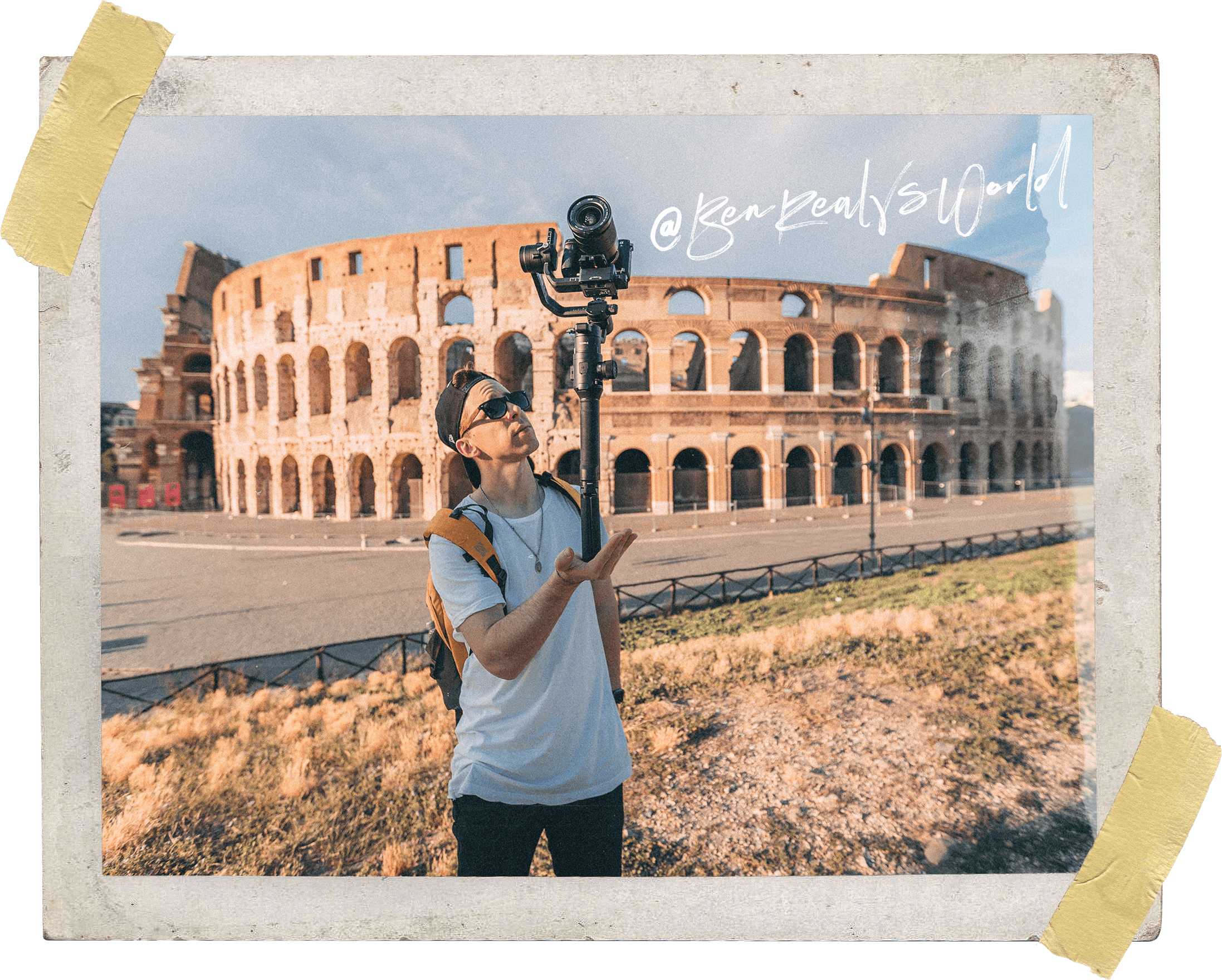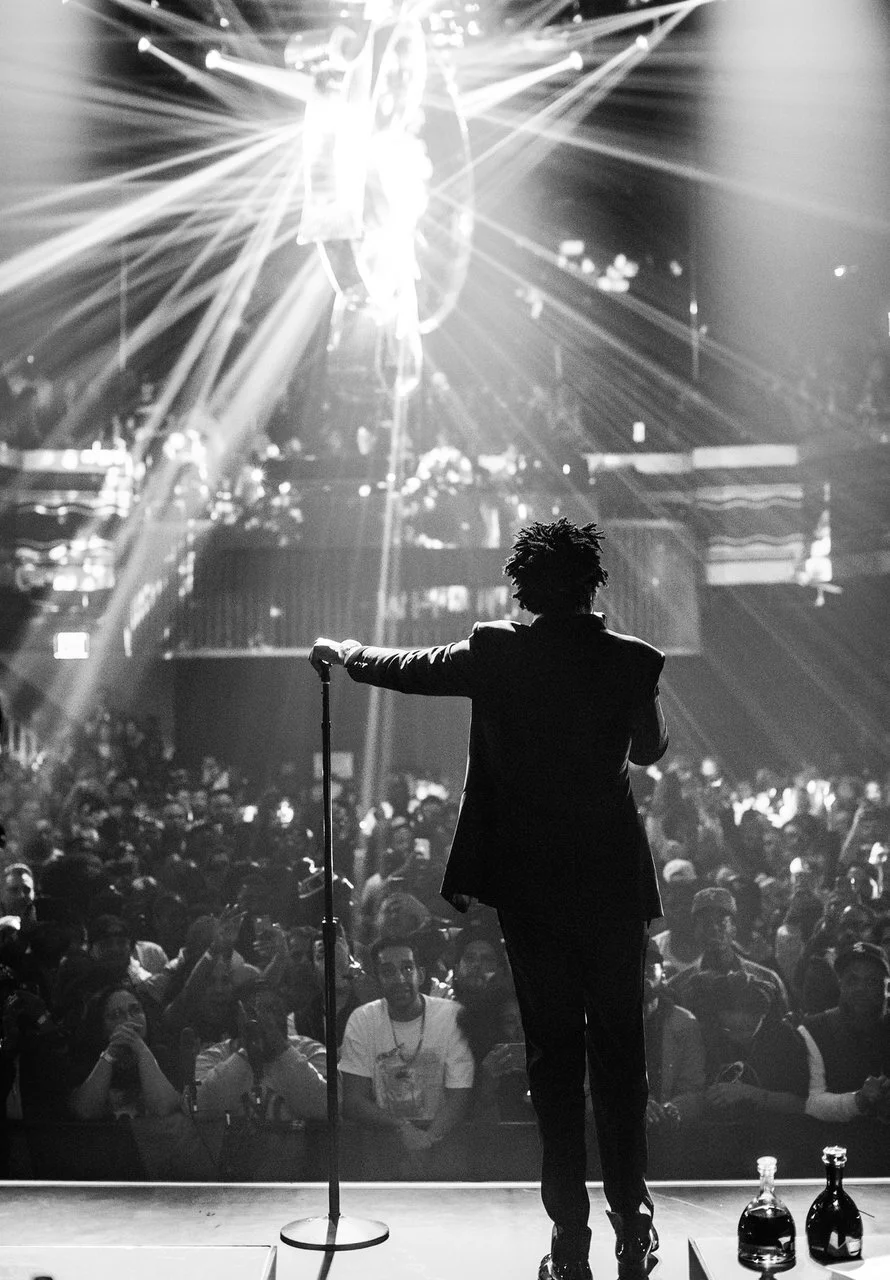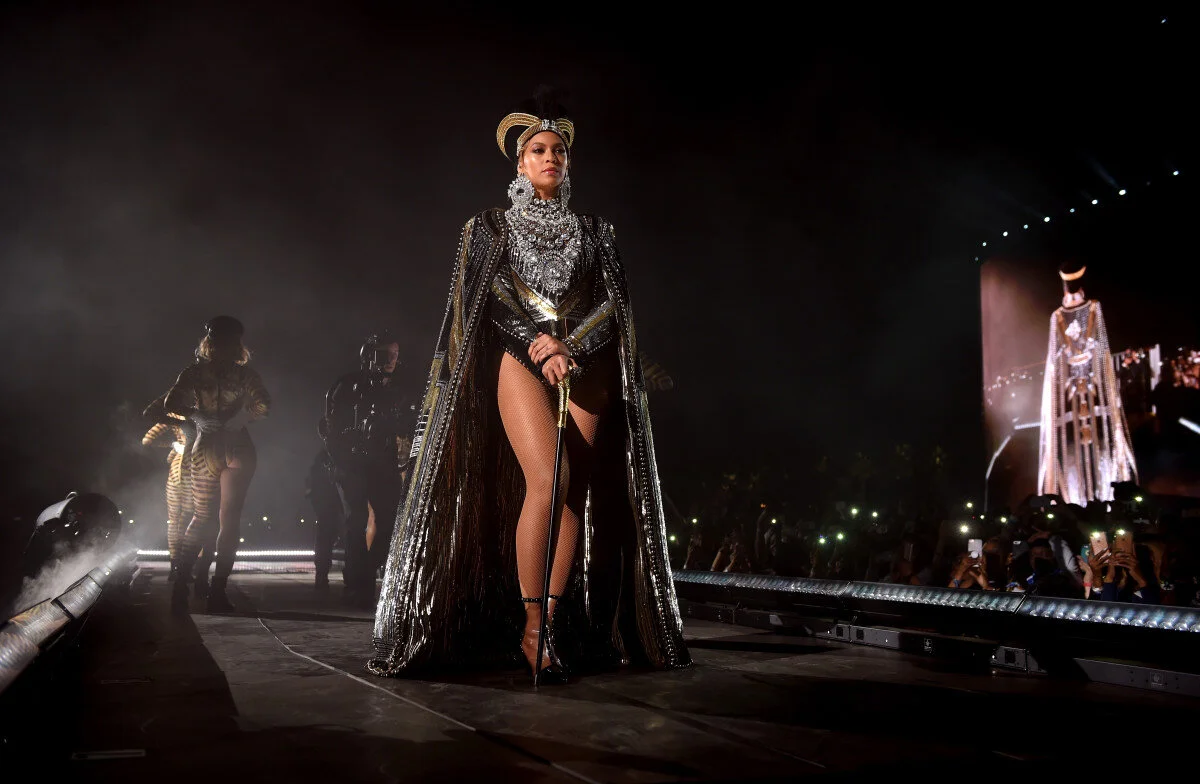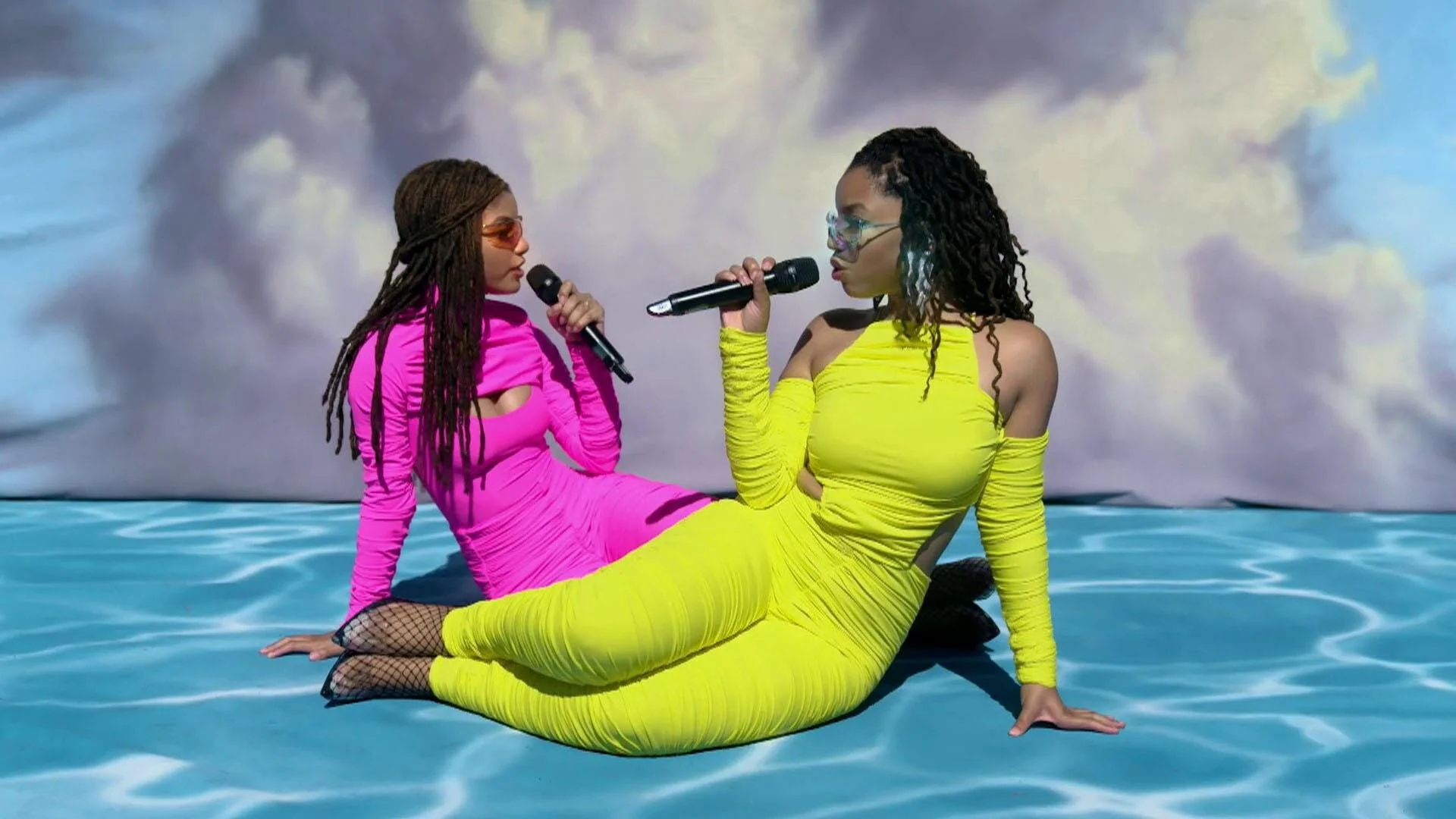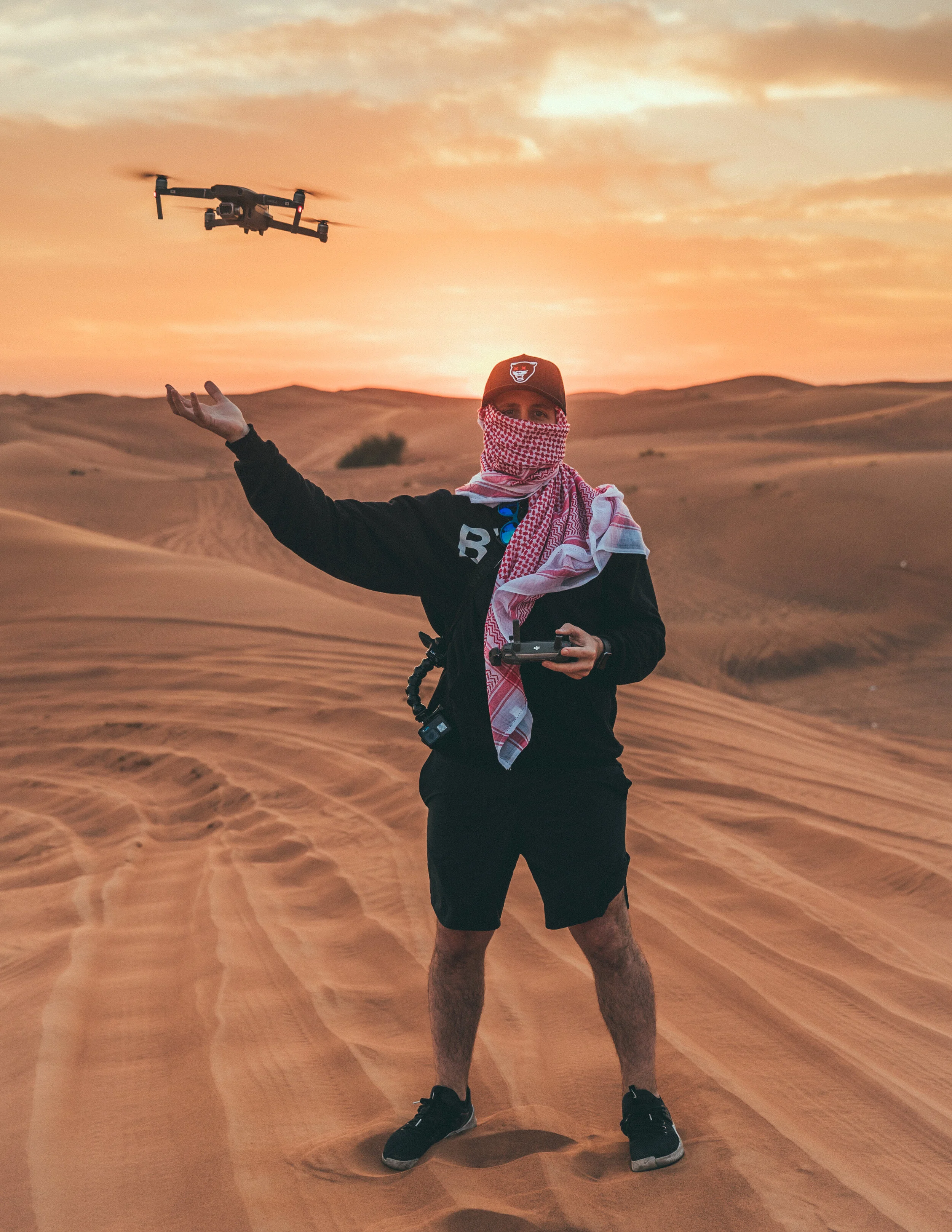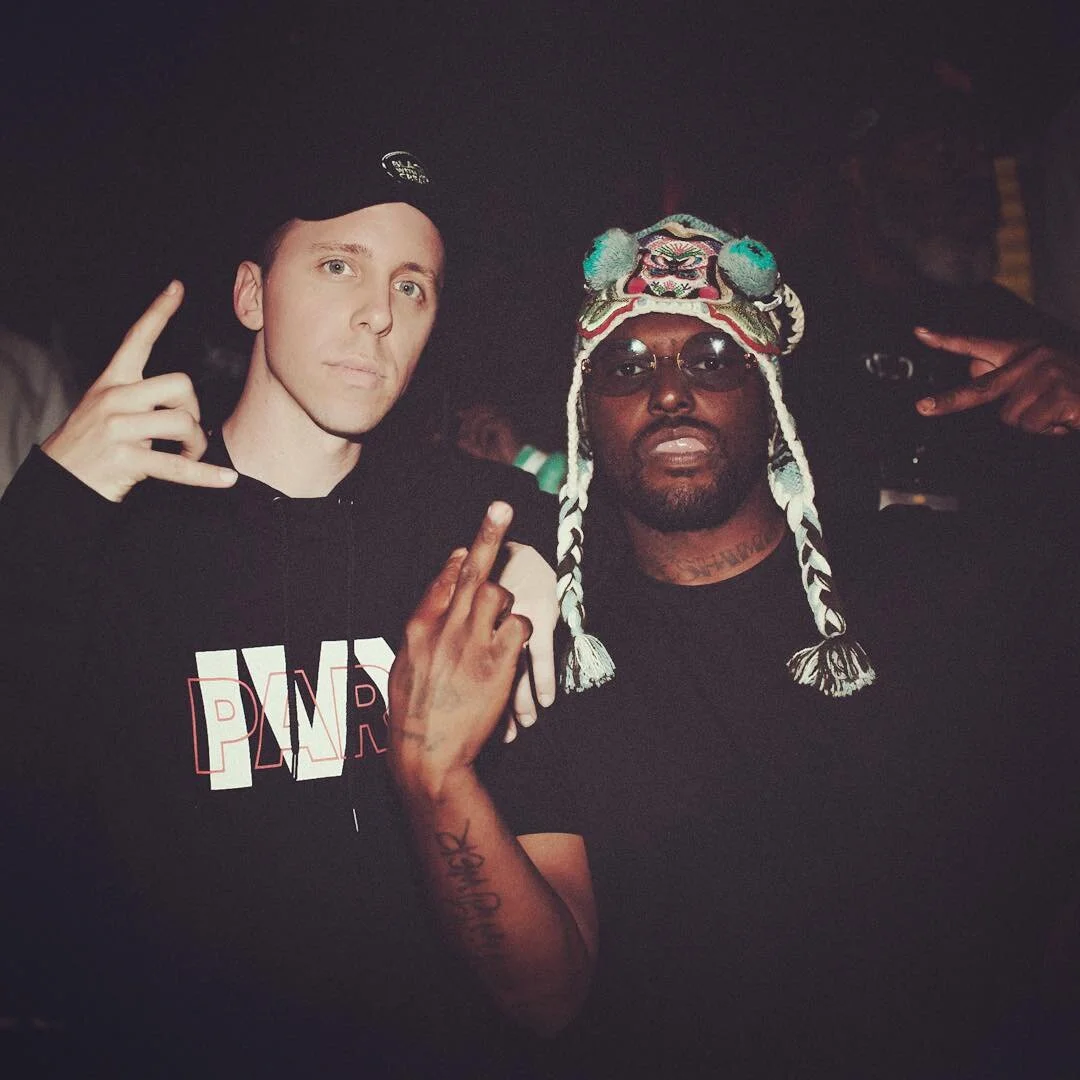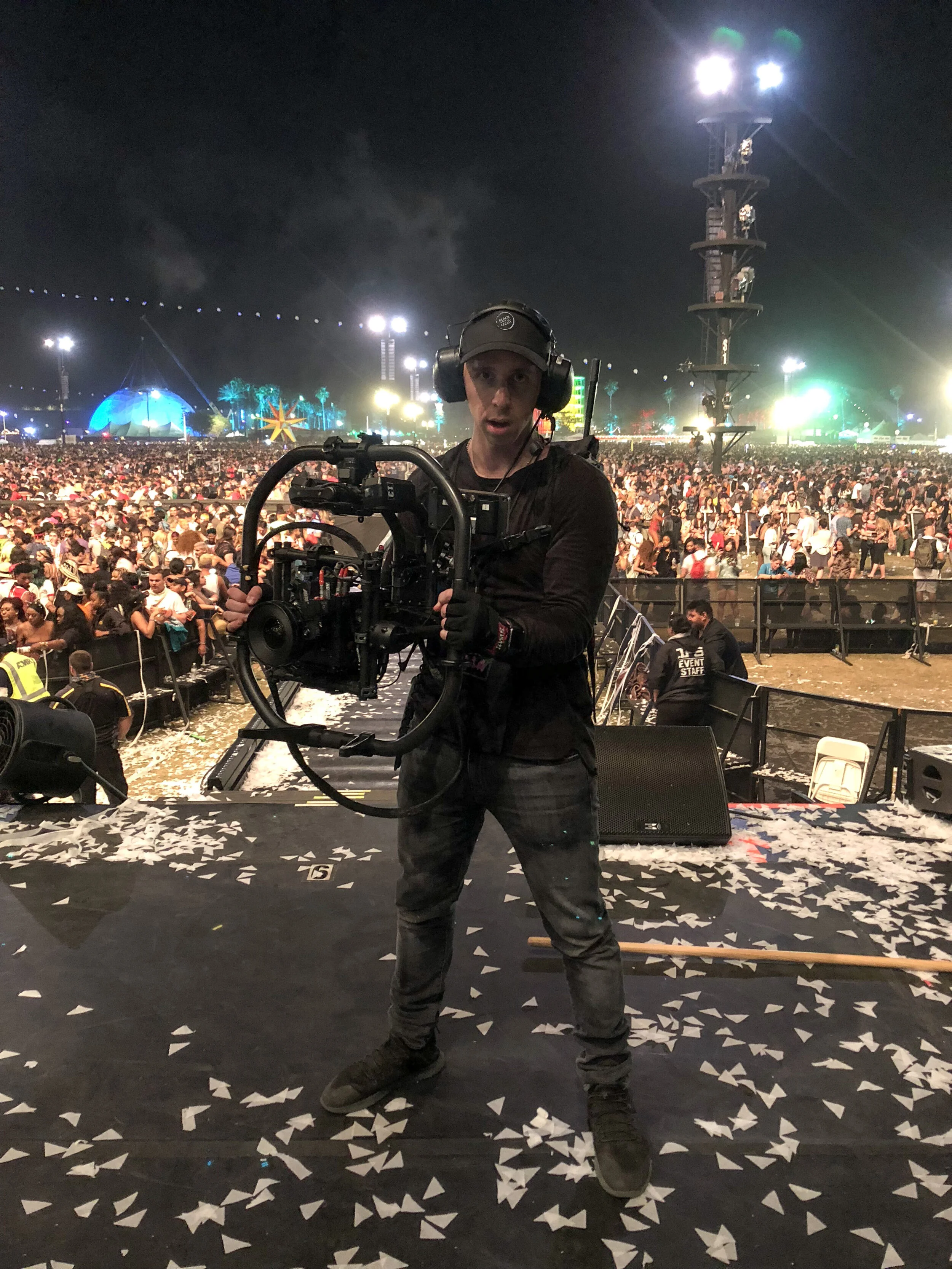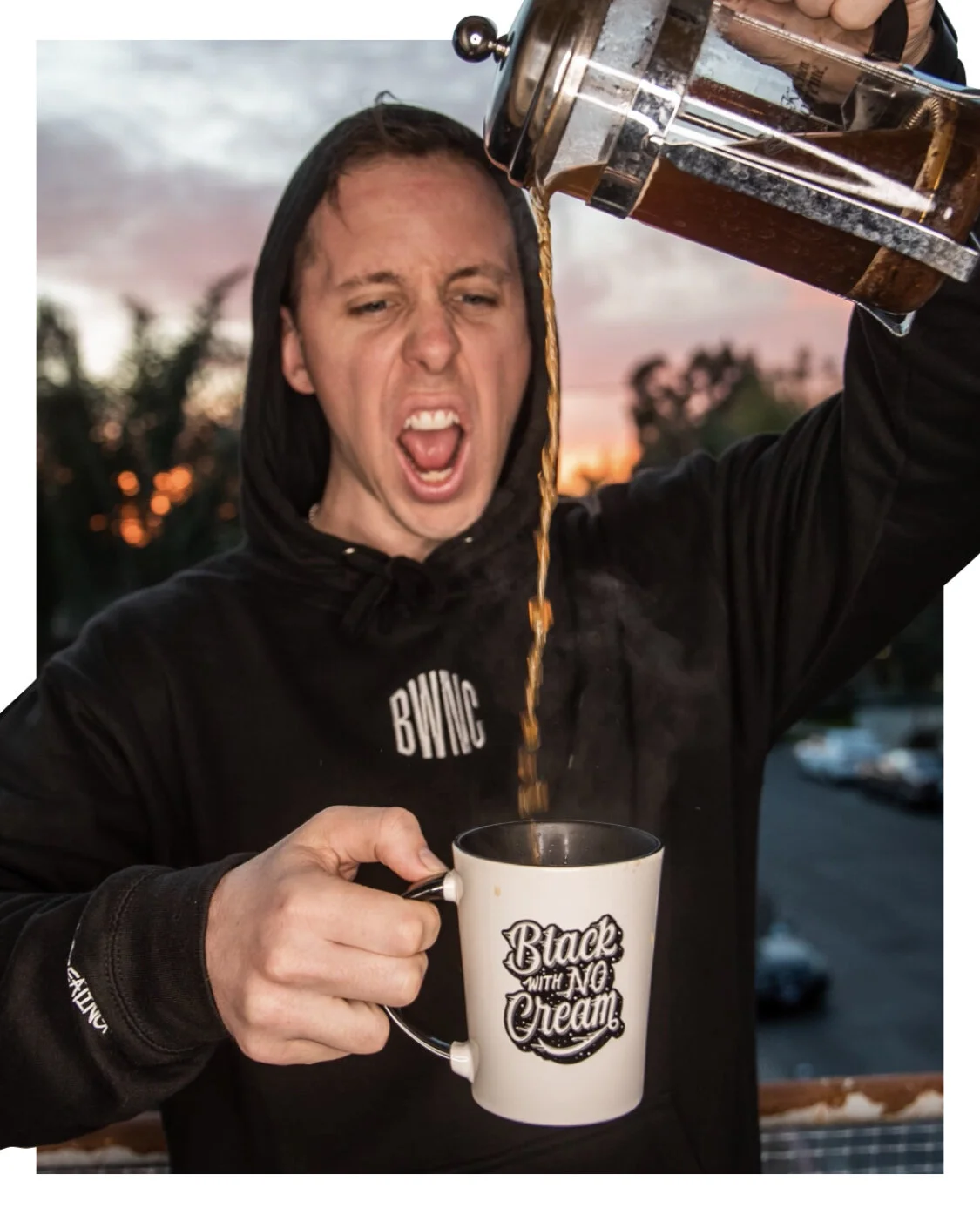Ben Hagarty
Diving into filmmaker Ben Hagarty’s content for the first time, it’s easy to get lost down the rabbit hole of engaging content. Media industry pros can be enigmatic, preferring to let follower counts, contracts, and big-name placements speak for themselves. And yet with Mr. Hagarty, there’s a wealth of information available. The heart and soul of his story – from his early days recording and producing music back with his band in Iowa, to his stint as a Google Maps photographer, to his time as a camera operator on tour with Beyoncé and Jay-Z – is available in crystal-clear detail on any number of podcasts.
The standout platform among them, however, is his own: Black With No Cream, “the illest educational resource for content creators, fueled by caffeine.” With Black With No Cream, Mr. Hagarty has interviewed some of the heaviest hitters in photography, videography, filmmaking, directing, and even music production “with the goal of educating, empowering, and inspiring content creators of all kinds.” His guests have shone a light on everything from how to get started in Hollywood as a steadicam operator to how to get your taxes done as a creative entrepreneur. And everything in between.
Through it all, Ben is focused on transparency, going into depth on ordinarily buttoned-up topics, and never afraid to shy away from the tough questions or dig into his guests’ interests. He’s passionate about elevating the creators around him, and skilled as an interviewer and a communicator, with an excitement about the projects shines through.
From someone who’s worked on documentaries for Beyoncé, Chris Brown, and Mary J. Blige, directed commercials for the NFL, and shot crucial camera footage for some of the biggest live events in the world, it’s refreshing, humanizing, and above all, inspiring.
Read on for the full conversation, where we talk getting free Chipotle on tour, directing an EA Sports livestream over Zoom, and why maybe you should move to LA.
You’ve spoken candidly about having wanted to go to film school, but also questioning if it were worth it at all. It seems like that’s a common crossroads for creators these days — between spending money to go to an accredited institution, and forging out on their own. Do you have any advice for people who might be at that particular crossroads?
I mean, I'm biased, 'cause I never ended up going to film school, but it’s an interesting topic to me because I understand the pros and the cons. I couldn't afford it, so I had to find an alternative. I leaned into everyday life as a way to learn, testing, trial and error, being willing to fail, trying to pick up any book, and constantly going at it, every day. That became my school.
Back when I was getting started, there wasn't as much information as there is now. Nowadays the problem is there’s so much [information] that it’s hard to figure out where to find the real value. When it comes to education platforms there are so many people teaching so many things — it’s hard to focus on what you really need. The benefit of school is that it’s a more concrete program, and if you don’t know exactly what you want to do, you have the advantage of testing a bunch stuff. There’s something exciting about that, but at the same time ... you can do that by yourself. You can try out a different role, learn everything you can about it, and then go figure out how to get your hands dirty with it. Like, if I want to be really good at flash photography, what do I need to do that? I need a flash, a camera, a lens, and I need to have multiple settings that I can test every day. You just have to go do it.
It's an interesting topic because it's based on who you are and where you're at in life at that moment. If you feel completely lost, and you need the help of mentors, there are multiple avenues for it. You can go to film school, because there are mentors built into those programs, but there are also mentors online that you can find.
Hopefully I’ve been able to hand something down ... but that's my purpose. I go a little bit harder than others do to make sure I'm educating. I care about teaching. But I have a lot of peers in this industry who don't — they just work, live their life outside of work, and get all these DMs and emails that they don't really pay attention to. It's not an active mission for them. I studied them back in the day, and no one ever responded to my emails or messages or anything. It just wasn't part of the culture back then. So I had to study their work from a bird's eye view, take advantage of whatever they put out, and try to reverse engineer it.
I saw a clip on Instagram where you mentioned that not taking jobs because they might not fit someone’s vibe, or “lane,” can stunt content creators’ growth, because it doesn’t challenge them. Can you remember a time that you took on a challenging gig that pushed you to your limits?
Every job, in some way, has applied that pressure. Every time I work with a bigger level of talent — the obvious example being Beyoncé and Jay-Z — the pressure is through the roof. That’s just the top of the pole in terms of artistry and talent.
One good example though: Recently I directed a campaign for the NFL and EA Sports — it was the pregame show of the first game of this past season, during COVID. They finally came back and were basically like, “We're going to play football!” So we made the pregame show, but I had to direct it all through Zoom. 30+ plus talent, with influencers, YouTubers, celebrities, comedians, ex- athletes ... actually the only current NFL player was [Pittsburgh Steelers wide receiver] JuJu Smith- Schuster. We had to put together a prerecorded livestream, an hour-long program, and I had maybe 5 days from start to finish to pull this off. It was this pressure of, “If you can't figure this out, none of this works.”
I built a small, rotating team, so they'd go home, sleep, and come back, and I’d literally still be there in our office going between producing, directing, editing, and organizing the edits. I was on meetings with the NFL, with EA, and also constantly trying to book talent. We were working around the clock. I literally didn't sleep for four full days in a row.
I've always had this drive, and I think all my past jobs helped build me up for moments like that. I could’ve gone home and slept, but I wouldn't have delivered. I knew every minute counted — I just had to have the endurance. I've done plenty of jobs where we worked long, long hours — you just go into psycho mode and grind it out. There's a lot at stake, and it’s all in your name, so you're going to work your ass off. You got booked for a reason, you know? And that's why they come to me. If they’re in a position with one of these last minute gigs, asking, “Who can solve this problem?’ Ben can. We don't know how but he does it, but he'll find a way.
That's gotta be some kind of record in terms of directing something through Zoom, especially with that mix of comedians, influencers, and athletes.
It was intense.
We had sketches, and then celebrities playing Madden against each other over Zoom, but I had to find creatives in different cities all over the United States. Shoutout to Black With No Cream, too, because that ecosystem helped, a lot. I found a creative in a random spot in New Jersey, and then I found someone in fucking Ecuador who was willing to fly down, last minute, to Mexico to meet up with talent ... all through the [BWNC] creative network. And I'm sitting here in LA trying to figure out how to solve problems like: How do we get a camera operator in the room just to film this superstar playing Madden? I remember trying to help Snoop Dogg figure out how to set up his iPhone to film himself at an alternative angle. He was awesome about it too, always with an attitude like, “Fuck yeah, let's get it!” So I'm sitting in a Zoom call with Snoop Dogg playing [gaming YouTuber] Dr Disrespect, and I'm on mute, but I’d chime in every once in a while trying to provoke conversations that I knew we'd be able to use in the edit. It was definitely one for the books.
“WE STARTED NETWORKING EARLY ON, AND IT WAS ALWAYS A QUESTION OF, ‘HOW CAN I BUILD RELATIONSHIPS WITH THESE PEOPLE?’”
You’ve mentioned that you grew up wanting to be a musician, and that you spent years producing your own music, throwing DIY-type shows, and “sleeping on the floor eating ramen noodles” while on tour. Is there anything you learned from that time period that you apply to your life now as a director, videographer, and business owner?
Honestly, what it comes down to is the network.
At an early age, I was on MySpace trying to find people who listened to punk music in Kentucky, Louisiana, Maine, Virginia ... wherever, just trying to find these people who went to shows (or even just looked like they went to shows). I used to message every single person like, “Hey what's up? I saw you listen to blah blah blah, and I do too. We’re a punk band from Iowa, and we're coming to your city just looking for anyone who's willing to book us. We’ll play basements, we’ll play garages, we’ll play outside, we don't give a fuck. We don't even care if you don't pay us, but some money for gas would be sick.” Whatever it took.
We started networking early on, and I learned how to talk my way into situations, or request things. It was always a question of, ‘How can I build relationships with these people?’ Since then, networking has been my biggest tool. Being able to talk to people and handle situations in a way that's going to build a relationship immediately ... it comes from those days.
There was a point in time when I was getting us free Chipotle every single day on like 52, 72-day tours ... every day. I swear to God. Sometimes twice a day. I figured out how to talk Chipotle managers into giving my entire band free burritos with double meat, all the extra stuff, at no cost to us.
I had a little spiel, and I was just like, “Hey we’re a band on tour, we were just in this city and hung out with the Chipotle here and blah blah blah and the manager was super cool and told us that you guys like supporting these broke artists who are on the road trying to make something of themselves. So yeah it would be awesome for you guys to support us, we really appreciate how much you guys care.” I just talked and talked I wouldn't let them get a word in, and I'd be like, “Yeah we just really love how you guys love music, and so we got six guys, we’ll be there around 6:00, oh and what’s what's your name?” And they'd be like, “... Mark?” And I'm like, “Alright cool Mark — should we just ask for you when we get there?” And he'd be like, “Yeah I guess?”
I made it up to the point where this person felt like maybe it was a policy that they didn't know about, and so when we pulled up they'd just be like, “Hey cool yeah — just hop in line and we’ll comp it.” Every day. I'm doing this every single day, and I guess through that I became a little more personable. I didn't stay in my shell, and that woke me up to be willing to kind of explore who I am, build friendships, and communicate.
That’s genius.
[Laughs] I haven't thought about that in forever!
There would even be times when I was off tour. I remember there was a time I was working a valet job at home [in Iowa], and the band I ordinarily would’ve been out on tour with called me while I was doing valet, and I had just picked up some dude's car, and they’re like, “Ben, we’re in Grand Rapids Michigan ... do that thing. Find us some pizza.” So I looked up “pizza in Grand Rapids,” and there was a really boujee spot, where the pizzas were $30 a pie. I called this guy and I did my thing, and next thing you know they’re delivering fucking 12 pizzas, 12 large pizzas, to this house show in Grand Rapids, Michigan where there are 100 straight edge kids ready to see a hardcore show. Meanwhile the guy on the phone’s like, “Yeah so when you guys are playing, just like ... let ‘em know about us.” And I’m thinking, “Sure, whatever, man ... my homies are getting free pizza in some state that I'm not even in.”
I listened to a podcast where you said that when you first came back to your hometown in Iowa, people had this idea that because you’d worked with Chris Brown, et al., you’d “made it” ... when in reality, you were sleeping on an air mattress with bubble gum filling the holes in it, making very little money while they had full salary jobs. I know that for a lot of creatives, the business side of things can be a challenge. I’m wondering if there was a lesson you learned regarding, finance, billing, business, or otherwise, that turned your career around.
That’s true — every time I’d come home I’d get all these weird finance-related comments like, “I hope they're paying you,” or, “Are you finally making some good money?” Like motherf*cker, if I were a local doctor, or nurse ... would you be asking about my finances? If I worked at the post office, are you going to be asking, “Hey are they finally paying you a salary?” What about me living in LA makes you feel like you need to know about my money situation?
I remember being on on tour with ScHoolboy Q, and having people DM me like, “You're crushing it — I hope they're paying you!” And I would literally lie, in response. I'd be like, “Hell yeah I'm being taken care of! It’s a dope opportunity!” Meanwhile all I’m doing is covering my rent at home, not profiting at all. I’d already spent 5 grand on a new laptop and a new lens, and the rest of the money I made from that tour went straight to my rent. But all that was fuel to the fire. It made me think, “I'm doing this ill sh*t — I’m so close.”
People have this perception that because you work with celebrities, it means you’re a millionaire. And I used to think that same thing, about the music video industry, specifically. I remember, as a kid, watching music videos and seeing Eminem free fall out of a building in the middle of a thunderstorm in ‘The Way I Am,’ and just thinking, “Someone did that. Someone made that sh*t look real, and I bet those are the people who live in the Hollywood Hills.” Then I moved out here [to LA] and I met the people who do the VFX on these massive music videos, and they’re making 45k a year.
I always tell a story about my homie [film director & VFX artist] JR Strickland. He was working for these big production companies, and he was literally living in this apartment without a kitchen, sometimes living out of his car. I remember he would stay at the office longer to watch the Cubs in the World Series because he didn't have AC. He didn't want to stay there any longer 'cause he worked so damn hard, but he was like, “I need to watch the Cubs and I cannot watch it at home 'cause it's too fucking hot in my apartment.” It blew my mind. We're creating some of the illest sh*t, and the people who are actually making it are barely getting paid anything. I never understood that.
We interviewed photographer & videographer Chris Allmeid, from Miami, a few months ago, and he argued that creatives taking on jobs for free (or for next-to-nothing) is actually driving down the value of photography and videography work and hurting everyone. What’s your take on that?
I see both sides of it. One part of me thinks, “Yo, if we all do that, how are we supposed to make people pay us what we're worth?!” But at the same time, in this industry, there's no way around it.
I worked out here in LA for free for well over a year and got some of the coolest opportunities: I'm working for free and I'm shooting for Mary J. Blige and Taylor Swift at the Staples Center. I'm working for free and I'm on set with Chris Brown. I'm working for very little money and I'm editing Chris Brown's documentary.
Those credits will turn into financial benefit later on down the road. And if someone's working for free, there’ll always be people thinking, “Well then why should I ever pay for that?” My answer will be, “Oh keep doing what you’re doing — you're just not going to work with me. If you’re hiring me to do something, we're going to do it the right way, and it's going to cost you money, so plan for that, but when we do it it’s going to be fantastic. If you want to cut corners and take your freebies and go get the people who are gonna work for you for nothing, go ahead! Build your hodgepodge shit. Your glue is going to break off. I'm Loctite in this sh*t and you’re Elmers.” [Laughs]
Trust me I've had those experiences. Then they realize, “Oh we gotta go to Ben for the legit work. We can't shorthand this sh*t anymore — we need the quality stuff.”
“I care about the process, and the creativity, and how people run their businesses and make a living with cameras.”
Towards the end of your interview on Justin Odisho’s podcast you mentioned photographer Drew Simms. I watched one video of his — about what it’s like to live out of a Jeep Wrangler — and I was just hooked. It struck me as a really unique type of content. Do you think there are any untapped potentials in the new world of videography & photography? What excites you about the next generation of creators?
I bought hella camping gear after watching his videos. They’re engaging. I envy him because he's curating content around an activity that he likes to do, but more importantly: it doesn't rely on anyone else. It’s based on him being able to go places, utilize the land, and then tell stories about the adventure.
Another great example: I have a homie named Tim [Dodd] who created a platform called Everyday Astronaut. Tim bought a fucking spacesuit, a real Russian spacesuit, on eBay when he was drunk one night, and it turned into this joke where he would take photos and pretend he was an astronaut stuck on earth trying to get back to space. Bear in mind, he is an ill photographer — his photos would get upwards of 5 million views on Reddit. One day he started putting up these YouTube videos with the goal of making space easy to understand for everyday people. And he quit photography.
So Tim was one of the most expensive wedding photographers in Iowa, and people would fly him out to different parts of the world to shoot their weddings ... and he gave it all up to run a YouTube channel that was getting something like 300 views per video. But he did it consistently all year, just kept making this content teaching people about space, and these days has almost a million subscribers. He livestreams events at SpaceX for rocket launches. He's interviewed Elon Musk on his channel. He's making an insane living selling merch to his subscribers and Patreon members ... he’s got all these supporters for a very niche topic, just like Drew Simms is in the woods filming these videos about living out of his Jeep. They find support because what they’re doing is so different. People who are able to bring us behind the curtain of some activity that most people can't do? That’s what’s interesting.
I'm inspired by that, and for me, it’s like, “Yo, I really want to help educate creatives. I work in production, but I really like helping people. So what can I do?” I don't know everything in the world, but I'm willing to teach what I know and help as much as I can. Honestly I think my advantage in the education space is that I'm connected to a ton of dope creatives. They don’t have to just be superstar names ... what I care about is the process and the creativity and how people run their businesses and make a living with cameras.
I love when you find creators who aren’t based out of the traditional media industry cities, who’ve carved out a niche in a totally different space.
Trust me, I have plenty of friends who are living what seem like ... healthier lives in a different cities. They may live in a smaller town, but they’re finding ways to do really big projects, and their cost of living is way down. In some of these places you could do five big jobs and live super comfortably that whole year, and then also get to travel and do all these extra activities on the side. Here in LA, you could be big in the industry but still paying out the ass just to live here, and constantly working.
Going back to Tim, he’s got a whole production studio in Cedar Falls, Iowa (where I’m born and raised), but he just bought another house down in Texas just so he could shoot these launches with a perfect view of SpaceX. Seeing creatives like that crack a new lane of a niche that people are interested in? I love that.
Do stories like that ever make you wonder if it’s possible to make it big in the industry without moving to LA or New York?
From my experience, anything is possible. But being in LA has changed my life.
The truth is, there are so many times where random dope sh*t has happened so fast. I’ve heard, “Can you be here in an hour?”, “Can you be here in 2 hours?” And if I didn't go in those two hours? I would’ve missed that gig. Working with Beyoncé, it was, “Can you be here by 10AM?” And I’m thinking, “That's right down the street!” Boom. I'm there. That turned into a full year of work, and then literally winning a Grammy. If I had to fly in for that? I would’ve been like, “Yeah I don't know, I gotta pay for the flight, and are you really going to book me?” Being here at the center of it all, there are so many doors that are easily opened. It's hard to outweigh that.
